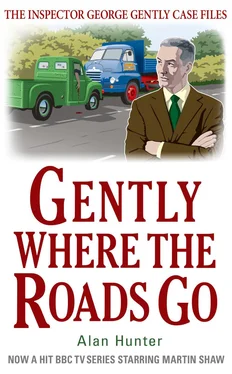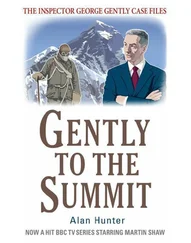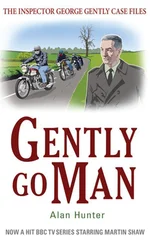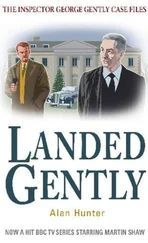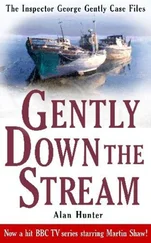Alan Hunter - Gently where the roads go
Здесь есть возможность читать онлайн «Alan Hunter - Gently where the roads go» весь текст электронной книги совершенно бесплатно (целиком полную версию без сокращений). В некоторых случаях можно слушать аудио, скачать через торрент в формате fb2 и присутствует краткое содержание. Жанр: Классический детектив, на английском языке. Описание произведения, (предисловие) а так же отзывы посетителей доступны на портале библиотеки ЛибКат.
- Название:Gently where the roads go
- Автор:
- Жанр:
- Год:неизвестен
- ISBN:нет данных
- Рейтинг книги:4 / 5. Голосов: 1
-
Избранное:Добавить в избранное
- Отзывы:
-
Ваша оценка:
- 80
- 1
- 2
- 3
- 4
- 5
Gently where the roads go: краткое содержание, описание и аннотация
Предлагаем к чтению аннотацию, описание, краткое содержание или предисловие (зависит от того, что написал сам автор книги «Gently where the roads go»). Если вы не нашли необходимую информацию о книге — напишите в комментариях, мы постараемся отыскать её.
Gently where the roads go — читать онлайн бесплатно полную книгу (весь текст) целиком
Ниже представлен текст книги, разбитый по страницам. Система сохранения места последней прочитанной страницы, позволяет с удобством читать онлайн бесплатно книгу «Gently where the roads go», без необходимости каждый раз заново искать на чём Вы остановились. Поставьте закладку, и сможете в любой момент перейти на страницу, на которой закончили чтение.
Интервал:
Закладка:
Felling grinned. ‘I see your point, sir. I was just trying to explain Madsen’s behaviour.’
‘Yes,’ Gently said, ‘it interests me too.’
‘There could’ve been something that needed covering up, sir’.
Gently kept on looking at the bottle. His fingers were covered with oil from it. The creases of his face had no expression. He looked at the bottle, turning it slowly.
Felling said: ‘I still think that Kasimir bloke is the only answer to the shooting, sir. I don’t reckon Teodowicz was a spy or anything, but there’s nobody else in the picture.’
Gently held up the bottle. ‘Have you an explanation for this?’ he asked.
‘Oh, I don’t know sir,’ Felling said. ‘Perhaps it belonged to Teodowicz, like Madsen says.’
‘Then one or other of them had a gun.’
‘It might just have been used for something else, sir.’
Gently’s head shook slowly. ‘Not what’s in this bottle. The Rangoon oil might. But not this stuff.’
Felling hesitated. ‘But isn’t it Rangoon oil, sir?’
Gently shook his head again. ‘You can see. It’s bluish. Rangoon oil has a yellow tint — and it doesn’t smell of citronella.’
Felling stared at the bottle too.
‘Then what do you reckon this stuff is, sir?’
Gently said, ‘It’s gun-cleaning fluid. From a service source. Perhaps the aerodrome you mentioned.’
The noise of the sparrows; the bottle held up; the trucks brutal in their size. The perfectly still hot air with its lading of petrol and stale oil. The submarine light on the two faces. One expressionless. One puckering.
Felling murmured: ‘It’s a coincidence, sir…’
‘Yes,’ Gently said. ‘I was thinking the same. What was the name of that aerodrome again?’
‘Huxford, sir.’
‘Yes, Huxford,’ Gently said.
He lowered the bottle, looked about the bench, found a balled-up page of a newspaper. He wiped the bottle on a piece of rag, wrapped the bottle and slipped it into his pocket. He looked at Felling.
‘I’ll leave the dabs to you,’ he said. ‘And the check on those cafes, where Teodowicz ate his last meal. And I’d like a couple of men to search this area, all these yards and derelict buildings. Can you manage that?’
‘Yes sir,’ Felling said. ‘Freeman and Rice can do the search.’
‘Tell them to keep an eye on Madsen,’ Gently said.
‘You bet I will, sir. We’ll tab that chummie.’
Gently nodded, led the way to the side entry. Felling produced the keys. They went out into the sun.
Four p.m. on the Thursday, and Offingham very nearly asleep. Gently’s car shimmered the air over it and opened its door like a broached kiln. He got in, drove down the High Street, across the Market, over the bridge; past two lines of greyed yellow-brick council houses, a couple of pubs, a filling station. Finally a third pub, standing thwartwise at the slovenly road junction, shouldered hard on the beaten passage of the A1 itself.
He halted there to choose his moment, then slid out into the stream. One car, two, went thrusting by him before the Rover picked up its stride. A tall articulated panted ahead of him, dark smoke puffing from its side. It was making fifty and the Rover needed all its guns to overtake. And so on southwards. Under a pale hazed sky.
Everham appeared, a slight congealing of the patchy drab ribbons. A chaffy triangle with a back road, a shop blazing with Dayglo posters. A blind red-brick church flat among dusty dark trees, a phone-box, an indistinct pub, a track worn in the bald verge. And then, for once, the ribbons faltered and gave way completely to grubby hedges; with behind them straw-coloured fields, folding slightly, weighted with hedge oaks. In the hazy distance, travelling like giants with their feet below the middle horizon, peered the three pink churns of Bintly power station, self-contemplative and aloof.
Another mile. An RAC box. A belt of sloe bushes to the right. To the left, southwards, the changing plane of the shallow roof of a hangar. Then the sign: Lay-By 100 yards, painted freshly black and white; and the ribbed concrete morosity of the lay-by beyond.
Gently slowed, picked a gap, pulled over and parked on the lay-by. It was a small one, designed for no more than two or three vehicles. Because the verge there was narrow the lay-by was pushed back into the hedge; the hedge was thin and had several gaps, and behind it ranged the thicket of sloe bushes. Gently got out. Underfoot the concrete was stained with plentiful oil-marks. Near the south end was a lighter area which had been recently washed off with a broom. Owing to the set-back a small vehicle parked there would be largely concealed from approaching traffic, but an observer stationed there would be able to spot headlights for about half a mile. Wrappers, paper, were strewn on the verge. In the ditch, a rusted bike frame.
He approached the hedge, the gaps in which showed signs of recent and frequent use. He stepped through it. Behind the hedge lay human faeces and paper. Into the sloe thicket, which was dense, went several tunnels or passages, as though a wild beast had made its lair there in the close gloom of the thorns. One of the tunnels opened opposite to the washed-off concrete. He ducked his head and went into it. Its underfoot soil was compact and unimpressionable. A few feet into the bushes it expanded into a little chamber, and here also lay faeces, paper rubbish, an old saucepan. He turned about and peered through the twigs. He was looking through the gap to the washed-off concrete. Several of the twigs were smashed and singed and hung withered from bleached fibrous stumps. He turned again, went on following the tunnel. From here it had not been used very often. The ground was still hard, but it had grown a little moss, and new twigs projected to obstruct his passage. Some of these new twigs were snapped and withered and some of the moss was slightly compressed. He went on following. He came out of the sloe bushes. Beyond them was a stubble field, hedges, more fields. Far away southwards, peeking just above low trees, was a roof painted dull red. No other building was in sight.
He returned slowly through the tunnel, examining the walls of it more carefully. The sloe-twigs ended each in a spike and not all the outstanding spikes had been broken. Some yards down the tunnel he paused: a spike low down showed a wisp of snagged wool. It had been caught from a garment moving in a direction away from the road and was of a darkish grey-blue, the colour of certain service uniforms. He felt in his pocket, found an old envelope, stroked the wool off the spike into it. Then he searched for some while longer, but the single wisp was all he found.
Sweating, for it was hot among the sloe bushes, he returned to the lay-by and the car.
‘Have you a pass, sir?’
The SP from the guardroom was wearing his shirtsleeves rolled and had a white armband. Both his arms and his face were sunburned as though he spent his off-duty hours working for a farmer. Gently pulled out his wallet, showed the warrant card. The SP looked at him sharply, knowingly.
‘Yes sir, I see,’ he said, after a slight pause. ‘I didn’t know sir. We weren’t advised in the guardroom.’
‘Weren’t advised about what?’
‘About the civvie police being called, sir. I thought our own blokes were going to handle it.’
Gently shrugged. ‘Could be two other people, but I’ve come here on my own business,’ he said. ‘I want to talk to your commanding officer. Perhaps you’ll ring and let him know.’
‘The commanding officer… oh, I see, sir!’ The SP coloured, looked embarrassed. ‘Wing-Commander Thompson is on leave, sir, and the acting CO is visiting Cardington.’
‘Then who do you suggest I should see?’
Читать дальшеИнтервал:
Закладка:
Похожие книги на «Gently where the roads go»
Представляем Вашему вниманию похожие книги на «Gently where the roads go» списком для выбора. Мы отобрали схожую по названию и смыслу литературу в надежде предоставить читателям больше вариантов отыскать новые, интересные, ещё непрочитанные произведения.
Обсуждение, отзывы о книге «Gently where the roads go» и просто собственные мнения читателей. Оставьте ваши комментарии, напишите, что Вы думаете о произведении, его смысле или главных героях. Укажите что конкретно понравилось, а что нет, и почему Вы так считаете.
